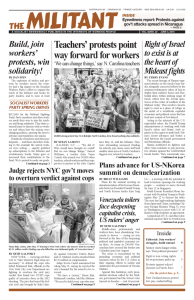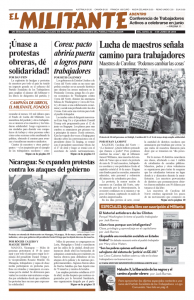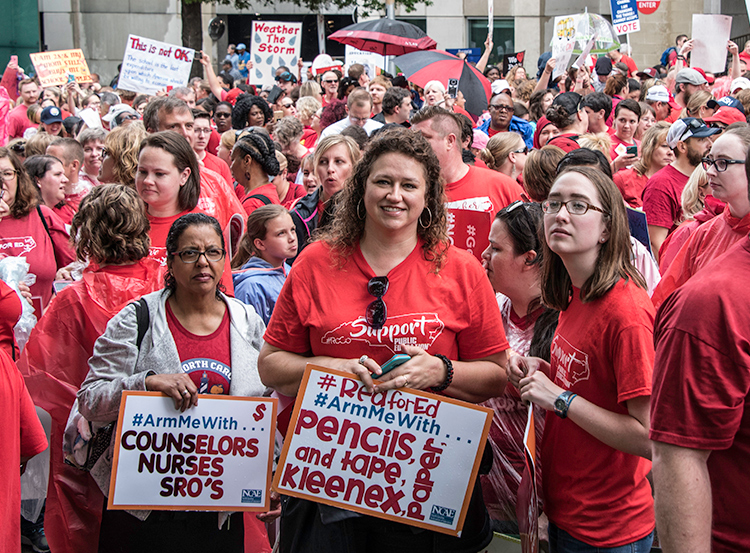RALEIGH, N.C. — “We did it! Who would have thought we could? But we can change things,” Jameel Williams, a teacher from Vance County who joined over 20,000 other teachers, school workers and their supporters to protest at the state Capitol here May 16, told the Militant. They were demanding increased funding for schools, pay raises, more staff and smaller class sizes at North Carolina’s biggest-ever action by teachers.
The protest was marked by determination, growing self-confidence and a good bit of humor, captured on the thousands of homemade signs.
In the days before the rally, growing numbers of school districts announced they would have to close, as thousands of teachers called in to say they’d be taking a “personal day” off.
At least 42 districts, including the state’s six largest, canceled classes, affecting nearly 1 million public school students. Teachers, parents and other volunteers organized to try to make sure the students had a place to go and food to eat during the rally. Teachers who came from districts that stayed open were each fined $50 for taking off.
Uprising against decades of attacks
North Carolina teachers were following in the footsteps of a movement that kicked off in West Virginia in late February, moving to Oklahoma, Kentucky, Arizona and Colorado. Tens of thousands have joined strikes, walkouts, walk-ins, picket lines and marches, saying, “Enough is enough!”
Union and nonunion teachers have organized with imagination, a distrust of legislators of all stripes and a search for ways to maximize the weight of the rank and file. They have won solidarity from other workers and transformed their fight into a broader social movement. They forged unity among the different school workers in the face of attempts by state governments to pit them against each other.

“I’m for the teachers getting more pay,” Wake County school bus driver Spencer Jenkins said at the rally. “But don’t forget the bus drivers, mechanics, custodians and cafeteria workers.” Like teachers, he said, many bus drivers also work a second job, some even a third.
“The fact that everyone is not a teacher, that means we’re bringing a community together,” Lindsay Harris, a Johnston County teacher, told ABC News. “We’re making changes together. We can’t do it alone as teachers.”
Diana Niemann, a science teacher from South Mecklenburg High School in Charlotte, told the Militant that a parent offered to pay for gas money so teachers could make the trip to Raleigh to join the action.
Many participants scoffed at the figures widely reported in the bourgeois media that claim teachers in the state make an average of $50,000 a year. With paltry or no raises year after year, inflation has pushed real wages down 9 percent since 2009.
Over the past years the state legislature has chipped away at teachers’ tenure, which protects those with seniority. The politicians have pushed “merit based” pay schemes, aimed at giving administrators arbitrary power over jobs and pay. Legislators are also moving to replace pensions with a 401(k) plan for all future state employees and to eliminate health coverage when they retire.
Budgets for supplies, textbooks and school technology have been slashed in half since 2009. “We have a library, but no librarian,” said Rachel Holdridge, a special education teacher at Wilmington’s Alderman Elementary School. “The library is for storage and meetings. The books are on the floor.”

“I’m concerned about the inequities, where some counties have more resources than others, like supplies, technical equipment, teaching assistants, especially in classes for students with special needs,” said Lauren Abraham, a second-grade teacher in Garner, a Raleigh suburb. Those who live in more working-class or rural areas have less access to local money to supplement inadequate state funding.
Hard to get genie back in the bottle
Thousands of teachers crowded into the legislative building May 16, chanting and waving signs. Much of the coverage in the capitalist
media emphasized this side of the day, underscoring the union officials’ perspective that lobbying and campaigning for Democrats they claim are “friendlier” to public education is the main job for school workers between now and the November elections.
But the fact is the capitalist rulers and their politicians are not really interested in public education. For them it’s only a way to impose obedience, not open learning. They use it to create a workforce that’s easier to control and exploit.
Legislators in Raleigh seemed most interested in getting the teachers out of the building, Mario Black, a middle school social studies teacher, told the May 17 Charlotte Observer. He was one of some 30 teachers who took part in a rally in Charlotte’s Marshall Park the day after the Raleigh protest to continue pressing their demands.
“When I got home from the rally I had tons of messages from teachers wondering what was next,” Greensboro middle school teacher Susan Skinner said by phone May 20. “We decided to wear red to school the next morning and many of us did, including teachers who weren’t able to attend the march. After school a dozen of us met to discuss all kinds of ideas to continue our fight.”
Even though the legislature is done for the year, several hundred teachers and other state workers rallied outside the Statehouse in Columbia, South Carolina, May 19, demanding more funds for schools and better pay.
“Our actions helped inspire them,” Skinner said.
In cities and towns across the country, other teachers are joining the uprising. In National City, California, teachers voted May 22 to authorize a strike if the school board refuses to meet their demands for higher pay and more teaching supplies.


